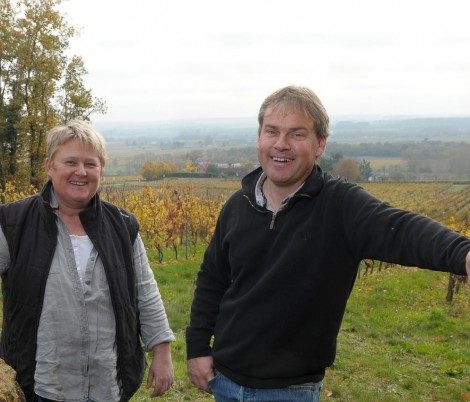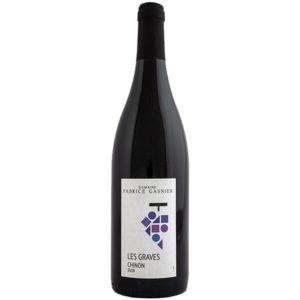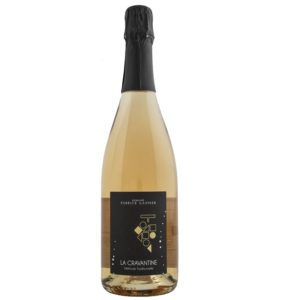Domaine Fabrice Gasnier

| Country | France |
|---|---|
| Appellation | Chinon |
| Variety | Cabernet Franc |
| Age of Wines | 35 to 70 years |
| Soil | chalk, gravel, sand and clay soils |
| Altitude | 150 to 350 ft. |
Organic & Biodynamic
Hand harvested, Estate produced
The fourth-generation Fabrice Gasnier and his wife Sandrine manage 25 ha of mostly old-vine Cabernet Franc planted on varying combinations of Chinon’s chalk, gravel, sand, and clay soils in and around the village of Cravant-lès-Côteaux. The Gasniers employ biodynamic techniques in farming, with no pesticides or herbicides. Yields are extremely low.
The results are aromatic, racy red wines, with great concentration and length. The wines are delicious upon release, yet would benefit from a few years of aging.
Fabrice Gasnier’s great-grandfather founded the family farm at the beginning of the 20th century. Aimé Gasnier had cultivated barley and corn, as well as raising cattle, sheep and pigs. Aimé’s son Hubert took over in 1935, and during WWII, a period when food was in short supply and red wine was often used as a substitute, he increased the vine holdings. In 1966, Jacky Gasnier, Fabrice’s father, converted the domaine entirely to the vine monoculture, planting parcels formerly used for pasture and grains. Fabrice joined his father with the harvest of 1990 and by 2000 had begun converting the domaine’s vineyard practices to organic (later on certified by Ecocert). Soon thereafter, he began implementing the principles and prescriptions of biodynamics, and later adopted it for all of his vine parcels. The domaine produces their still, sparkling rosé wine and reds with the main grape of the Loire Valley – Cabernet Franc. The vinification takes place in small capacity cement vats, in the thermo-regulated cellar.
Terroir and Viticulture
Granitic soil has the distinction of storing heat during the day to restore it at night. Clay-silicon is composed of clay and sand, and it is a very filtering soil which tends to deprive the vine of water thus forcing it to plunge its roots in depth in order to draw its food. Flint clay is a compound of clay and flint that can be found on the hillsides. Limestone clay is composed of layers of chalk (tuffeau) deposited by the sea in the secondary era and these soils occupy the hills and plateaus which dominate the valleys. In the basement, from 40 cm and up to 2 meters, they have limestone – their tuff of Touraine that can be found in all the terroirs of the area.
The different tillage, plowing, stripping, weeding, hilling, etc. encourage the vine’s natural instinct to find water and food in depth (5 to 7 meters). In some plots, they leave a natural grass in the middle of the row, in order to compete with the plant in nutrients. During active vegetation, they use products for a natural treatment: sulfur, copper, seaweed, mushrooms, etc. The compost very rich in microorganisms is prepared, containing bacteria and aerobic fungi, which are the pillars of the soil microbial ecosystem.
The Philosophy
The Domaine Gasnier favors permanent exchanges between the Mother Nature and the winemaker in order to bring about the essential character features of a vintage. Their desire is to interpret the terroir as precisely as possible, while respecting the rigorous principles of organic farming. Biodynamics seeks to strengthen the vitality and resistance of plants, by improving natural exchanges. Biodynamic wines guarantee a good expression of the terroir.
In 2009, Domaine Gasnier was certified Biodynamic by Demeter. That same year, the domaine made its debut in La Revue du Vin de France’s annual Classement of The Best Wines of France.
SHOP
Fabrice Gasnier La Cravantine Cremant Rosé NV
Fabrice Gasnier La Cravantine Cremant Rosé NVFabrice Gasnier La Cravantine Cremant Rosé NV
Fabrice Gasnier La Cravantine Cremant Rosé NV-
$30.00Add to cart
-







